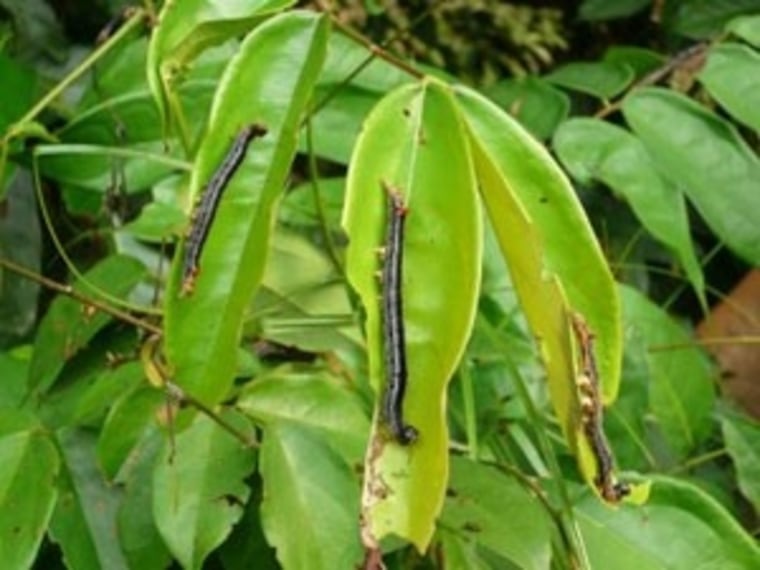Liberia's worst caterpillar plague in three decades has spread to neighboring Guinea after swarms of the crop-eating insects devastated more than 45 towns in the West African nation, officials said Friday.
Thousands of farmers have been unable to venture onto their farms. The caterpillars were advancing in the tens of millions, devouring food crops and clogging wells and waterways with excrement, the Rome-based Food and Agriculture Organization said.
Agriculture experts from Liberia urged that the pests be attacked with aerial spraying quickly before they destroyed even more areas.
The outbreak, which began in central Liberia, has been blamed on last year's unusually long rainy season. The invasion already has affected two of the leading food-growing provinces in Liberia, which is still recovering from years of civil war.
On Friday, officials said the pests also had invaded Lofa County on Liberia's northern border with Guinea.
The FAO's emergency coordinator in Liberia, Tim Vaessen, confirmed that the caterpillars had entered neighboring Guinea and said the infestation "could be a regional problem" if it is not attacked soon.
Liberian Agriculture Minister Chris Toe said aerial spraying was needed in the central town of Shankpala, 120 miles northeast of the capital, Monrovia. The coffee- and cocoa-producing area has been hard-hit by the dark, hairy pests.
Bendu Jabateh, whose mud-plastered hut is located close to an infested coffee farm, said she no longer felt safe leaving her two children outdoors.
"This is becoming a no-go area for us. We cannot go to our farms and we can't have our children play around the town any longer," said Jabateh, cradling her toddler son. "They crawl and come into the house."
Toe said specimens have been sent to Ghana and the United States to confirm suspicions that the pests are army worms.
About 30 pest control workers were already using manual ground sprayers to try to contain the outbreak in central Liberia. But eradication is a problem — the pests dwell on the leaves of giant forest trees that can rise more than 26 feet (8 meters) and aerial spraying risks further contaminating water sources.
In Shankpala, an ill-equipped spraying team has not made any serious impact. Residents instead have lit fires to keep the swarms at pay.
"When we set fire to certain places around the town, the caterpillars will bypass and attack in different locations so we are ... tired of using fire now," said rice farmer Johnson Kolleh. "We need modern methods to fight the spread."
In Pelelei, a creek used for drinking water was polluted by the pests' feces.
Coffee farmer James Kolleh, 22, explained that some spraying had been done in the town "but we were terrified when the chickens that eat the dead pests all died. These caterpillars must be very poisonous."
The last time Liberia experienced such pest invasion was 30 years ago, but officials then were able to prevent its spread.
Liberia was ravaged by alternating civil war and coups between 1989 and 2003. The drawn-out conflict left about 200,000 people dead and displaced half the country's population of 3 million.
The country — created to settle freed American slaves in 1847 — is still struggling to maintain a fragile peace with the help of U.N. peacekeepers.
